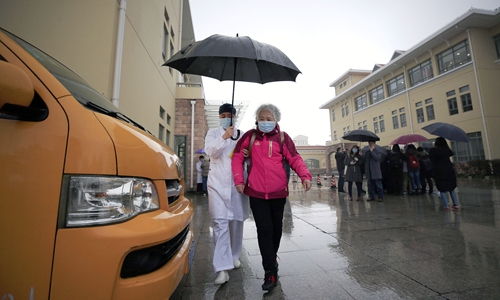HOME >> CHINA
'Shanghai mode' of stricter COVID-19 discharge standards ensures zero relapse
By Huang Lanlan in Shanghai and Deng Xiaoci in Beijing Source:Global Times Published: 2020/3/3 19:38:40 Last Updated: 2020/3/3 22:09:58

COVID-19 patients are discharged from Shanghai Public Health Clinical Center after recovery Photo: Yang Hui/GT
Frontline medical experts in Wuhan, epicenter of the COVID-19 outbreak, have suggested that hospitals adopt "Shanghai mode" standards to discharge patients, as these are more stringent than those stipulated nationwide, to ensure victory in the epidemic battle.Zhang Zhan, one of the esteemed medical experts fighting on the epidemic frontline in Wuhan, was quoted by media on Tuesday, suggesting that the current discharge standards for COVID-19 patients are "too loose," which came amid public concerns aroused by a few recent cases of recovered patients testing positive after being discharged from hospitals.
"Among the 18 patients who met the national discharging standards but stayed at hospital for longer days at our request, 13 showed positive on the third nucleic acid testing," Zhang Zhan said.
In South China's Guangdong Province, media have reported that some 14 percent of the patients discharged there tested positive afterwards as of February.
Commenting on the situation, Guo Yanhong from the National Health Commission said on Friday no case was discovered where discharged patients transmitted the disease to others.
Against this backdrop, many suggested that discharge standards in Shanghai, which include tests not only of patients' throat swab samples but also their anal swab ones, and longer compulsory quarantine terms for medical observation, should be a safer option for the whole country.
Zhang Wenhong, director of the department of infectious diseases at Huashan Hospital who heads a Shanghai medical team to fight the epidemic, confirmed the more stringent measures and standards with the Global Times during a group interview in Shanghai, noting "The city has made preparations in advance to respond to [the possible disease rebound]."
Zero patients have tested positive after being discharged from hospitals in Shanghai as of Tuesday.
Peng Zhiyong, director of the ICU at Zhongnan Hospital of Wuhan University, noted that the "Shanghai mode" and related measures were advanced and turned out to be effective, but "they are feasible for cities like Shanghai with a few hundred cases."
Though we want to copy such a mode in Wuhan, the reality is it is hardly practical here, Peng told the Global Times. Over 23,000 patients have been discharged from hospitals in Wuhan as of Tuesday afternoon, and "Wuhan does not have enough medical resources including medics and devices to simply copy the Shanghai mode," he said.
Wuhan is strictly observing the national discharge standards, he stressed, while making proposals that local hospitals should give compulsory and regular follow-up checks to their discharged COVID-19 patients after the practice, which is very important to the well-being of the patients as well as the people they came into contact with.
On whether to include anal swab tests in the national discharge standards, observers said such a decision should be made with prudence, and it has yet to be determined to what extent such test results could indicate the readiness of a patient to be discharged.
Posted in: SOCIETY